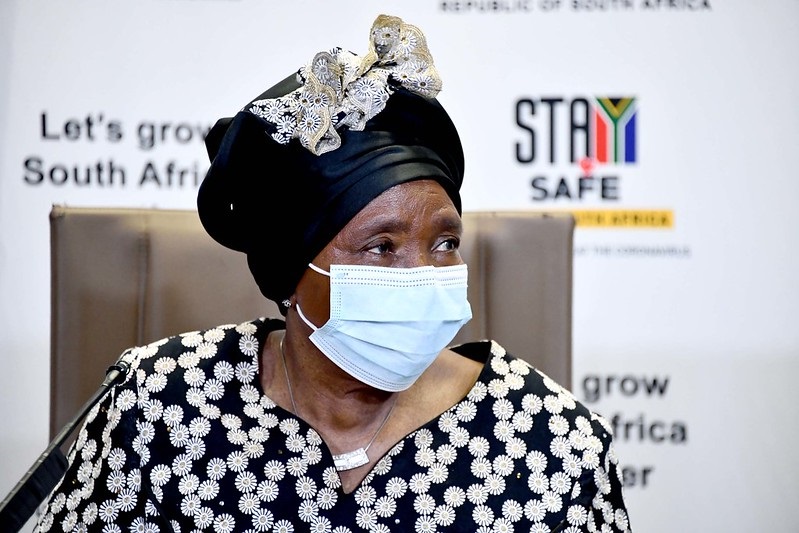News
After 8 years promising to end load shedding, Ramaphosa has now put NDZ in charge – with Covid-19-level powers

Minister of Cooperative Governance and Traditional Affairs, Nkosazana Dlamini Zuma, during one of her many pandemic-response press conferences. (GCIS)
News analysis
- South Africa needs “a single point of command” on the electricity crisis, President Cyril Ramaphosa says.
- And, as of Thursday night, that is his once bitter political rival Nkosazana Dlamini Zuma.
- Dlamini Zuma now has the same sweeping power she held to combat Covid-19, down to the ability to ban booze and cigarettes.
- The system of disaster management was never reformed.
- Dlamini Zuma is immune from removal and, as things stand, the new electricity minister will answer to her.
- For more stories, go to www.BusinessInsider.co.za.
In 2015, and many, many times since, President Cyril Ramaphosa promised that load shedding would soon be history.
For the past five years, Ramaphosa has been where every buck stops, but for years before that, he was Jacob Zuma’s delegated Eskom saviour, setting up war rooms and commanding structural changes to the electricity system.
On Thursday night, he handed that torch – or perhaps poisoned chalice – to Nkosazana Dlamini Zuma, the candidate he beat to become president despite her backing from the ANC faction mostly referred to as the Radical Economic Transformation (RET) group.
That gives Dlamini Zuma a tremendous amount of theoretical as well as practical power, which ANC politics will make almost impossible to wrest away from her again.
“In a time of crisis, we need a single point of command and a single line of march,” Ramaphosa said in his State of the Nation Address, in what was likely intended as a continuation of his recent message on load shedding: everyone needs to pull together to solve a problem that the government manufactured.
But 50 words later, Ramaphosa referred to a just-declared national state of disaster on electricity, and that document very firmly makes Dlamini Zuma the single point of command.
In its invocation of legal powers, the disaster declaration is a direct copy of the one which put South Africa into a state of disaster due to Covid-19. It gives the exact same five reasons why Dlamini Zuma could issue “directions”, or rule by decree: to protect the public, to offer relief, to protect property, to combat disruption, and “dealing with the destructive nature and other effects of the disaster”.
That language was created to deal with the kind of disasters routinely declared in South Africa, mostly drought and floods. But when Covid-19 hit, Dlamini Zuma used those powers to, or gave other ministers the delegated power to, close borders, decree what clothing shops may sell, and impose a curfew.
At the time, and in subsequent defence against legal challenges from furious citizens, she justified such sweeping measures on the basis that the coronavirus could have killed many more people but for those steps.
On electricity, Dlamini Zuma has declared that the state of disaster is required to prevent the total collapse of the grid, something so dire that it arguably justifies action as extreme as those to stop the coronavirus from overwhelming health facilities.
Under a state of disaster, Dlamini Zuma’s actions are not subject to review by Parliament. She can extend the national state of disaster indefinitely. Efforts to reform disaster laws, to change both those things, went nowhere.
During the Covid-19 state of disaster, the courts proved both slow and generally loathe to intervene.
That leaves Ramaphosa as the only check on Dlamini Zuma’s powers. He can, instantaneously and without reason, remove her from her post, which would immediately end her ability to issue decrees. Given the deep divide within his party, though, firing Dlamini Zuma would almost certainly trigger an attempt to remove Ramaphosa himself – with a real chance of succeeding.
Electricity would get its own minister, Ramaphosa said on Thursday night, “to assume full responsibility for overseeing all aspects of the electricity crisis response”.
Except not quite. Any normal ministerial powers are overridden by a state of disaster, and in a state of disaster other ministers, say a new minister of electricity, has exactly such additional powers as are delegated by the minister of cooperative governance.
So, for good or ill, ultimate responsibility will still rest with Dlamini Zuma, as long as she holds that post.
